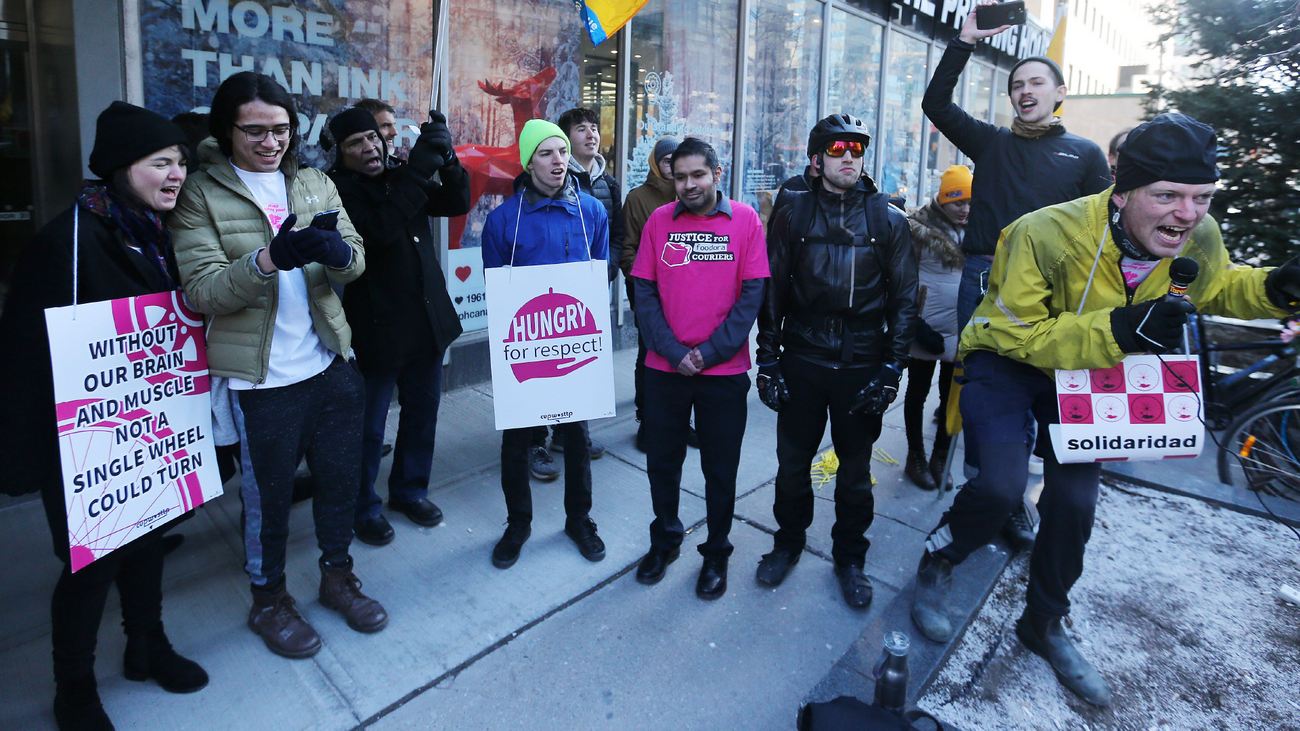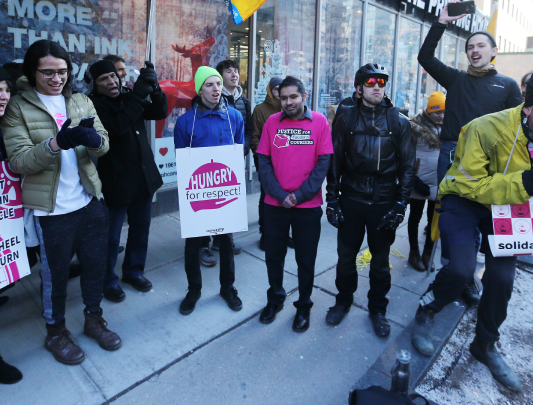
“Without our brain and muscle not a single wheel could turn.” The Ontario Labour Relations Board recently ruled in favour of Foodora workers who wanted to form a union. Photo by Steve Russell.
Rethinking labour law for the new world of work
The system has been in need of change for some time, says law professor Bethany Hastie.
Bethany Hastie, an assistant professor at UBC’s Allard School of Law, is exploring ways in which Canada’s labour laws can evolve to serve a rapidly shifting 21st century labour market. With a growing divergence between the legal regulation of work and its reality on the ground, she investigates what a meaningful system of labour rights must account for, and aims to make collective workplace representation more accessible, suitable, and effective for today’s workers.
What changes are we seeing in the 21st century labour market to necessitate a reform of Canada’s labour laws?
One key issue we’ve seen since the turn of the century is the decline of the standard employment relationship: full-time, full-year, permanent employment with one employer. There are reasons to question whether and for whom it really ever was the norm, but certainly today we're seeing far fewer people in standard employment, and more people in forms of precarious or non-standard employment – whether it be part-time, seasonal, casual or, more recently, gig work associated with the rise of the platform economy.
Precarious work is characterized by unstable hours or pay, as well as the insecurity of not knowing if there's ongoing employment. There's often a lack of access to secondary benefits. And (although not all definitions of precarious labour require this) I tend to focus on forms of precarious labour that are characterized by low wages.
The explosion of platform work, along with the onset of COVID-19, has rendered visible a lot of gaps in current labour laws, which were designed with the standard employment relationship in mind. And as standard work declines, we're witnessing a direct correlation with a decrease in access and entitlement to the labour and employment rights that have historically attended that kind of relationship.
What is preventing precarious workers from accessing employment rights?
Many platform workers, say in food delivery or ride-sharing services, have been unilaterally designated as independent contractors by the corporations with whom they work. That means they are responsible for their own working conditions. They're viewed as an equal bargaining party in a contractual relationship, and not as an employee.
Because of this independent status, they have no access to employment standards laws, which set out things like minimum wage, and, depending on the particular laws of the jurisdiction where they work, questionable access to labour law in terms of organizing a union.
COVID has also highlighted the precariousness of other forms of work that clearly fall within labour and employment laws. Many restaurant servers and retail clerks, for example, are not in full-time, full-year employment, and don't have access to benefits like paid sick leave. In industries with high turnover rates, a casualized workforce, and a lot of part-time workers, it can simply be, from a practical point of view, very difficult to successfully form a union.
Have platform workers launched any legal challenges to their independent contractor status?
Platform-based workers have challenged their statuses as independent contractors in many places, including the US, UK, and Australia.
In determining whether someone is an independent contractor or an employee, one quite significant criterion is the question of who owns the tools of the trade. Is the employer providing the tools and the material conditions for the work, or does the worker own them? If the worker owns them, that could weigh heavily in finding them to be an independent contractor. And with ride-sharing and food service delivery in particular, a lot of the discussion has started from an assumption that the tool is the vehicle.
In one recent case, however, the Ontario Labour Relations Board ruled in favour of Foodora workers who wanted to form a union. In its decision, the board found that the tool is not the vehicle, but the technology that facilitates the work. It's the app. And that app is owned by the corporation, which uses it to exert significant control over the workers. The board concluded that Foodora workers were dependent contractors who could legally form a union under Ontario labour laws. Shortly after that decision, Foodora closed its operations in Canada, citing a lack of profitability and increased competition in the marketplace. Despite that, the board’s decision represents a significant shift in how labour law is defining platform-based work.
Ensuring that work is properly categorized under law and that benefits and rights apply broadly to all forms of work is an important first step in law reform. When there is significant dependence on the corporation with whom one's working, that corporation should be properly understood as an employer and not just a party to a contract.
“Law reform needs to be attached to larger conversations about dignity at work, and what that looks like today.” ~ Bethany Hastie
How else are workers mobilizing?
One of the interesting things we've seen since COVID struck, and basic and material work issues like wages, security, and sick pay benefits have resurfaced, is some movement towards unionization in historically underrepresented industries that have proven quite challenging to unionize. For example, in BC there were successful unionization drives in 2020 in long-term care homes, food services, and retail businesses.
In the case of platform workers, who have questionable access to unionization or employment rights, some jurisdictions have crafted specific regulatory instruments to address core issues. The city of Bologna in Italy, for example, passed a Charter of Fundamental Digital Workers’ Rights that gives platform-based workers some basic rights, such as access to a minimum wage. New York City recently passed a similar legislative package.
There have also been a number of one-day strikes by precarious workers in a variety of industries in the United States in the past few years. These lie outside the traditional understanding of strikes as union-led action against an employer to disrupt their economic operations. The goal has been to garner public awareness of and support for the workers’ legal causes. That has been a notable trend, because some of them don't have an employer, ostensibly, to bargain with. But even for those who do, it can pull leverage to their side.
Researchers have documented that platform-based workers are utilizing technology effectively to connect with each other and to have that public-facing visibility. They are even creating technologies of their own to compete with these larger corporations.
How do you see employment relations and the law changing over the next decade or so?
Since COVID, we've seen a lot of calls in BC and across Canada for the introduction of paid sick leave for all workers, and not only employees who might have it written into their employment contract. Labour and employment laws certainly need updating to better reflect contemporary landscapes, but I think that law reform needs to be attached to larger conversations about dignity at work, and what that looks like today.
The extensive and significant publicity that platform workers have been able to attract could be a catalyst for a deep and renewed conversation that will hopefully lead to substantial change in how the law understands and accounts for work and workers, and how labour and employment laws extend both formal entitlement and practical access to rights at work.
The system has been in need of change for some time, and this may be the moment that finally produces that change.



































